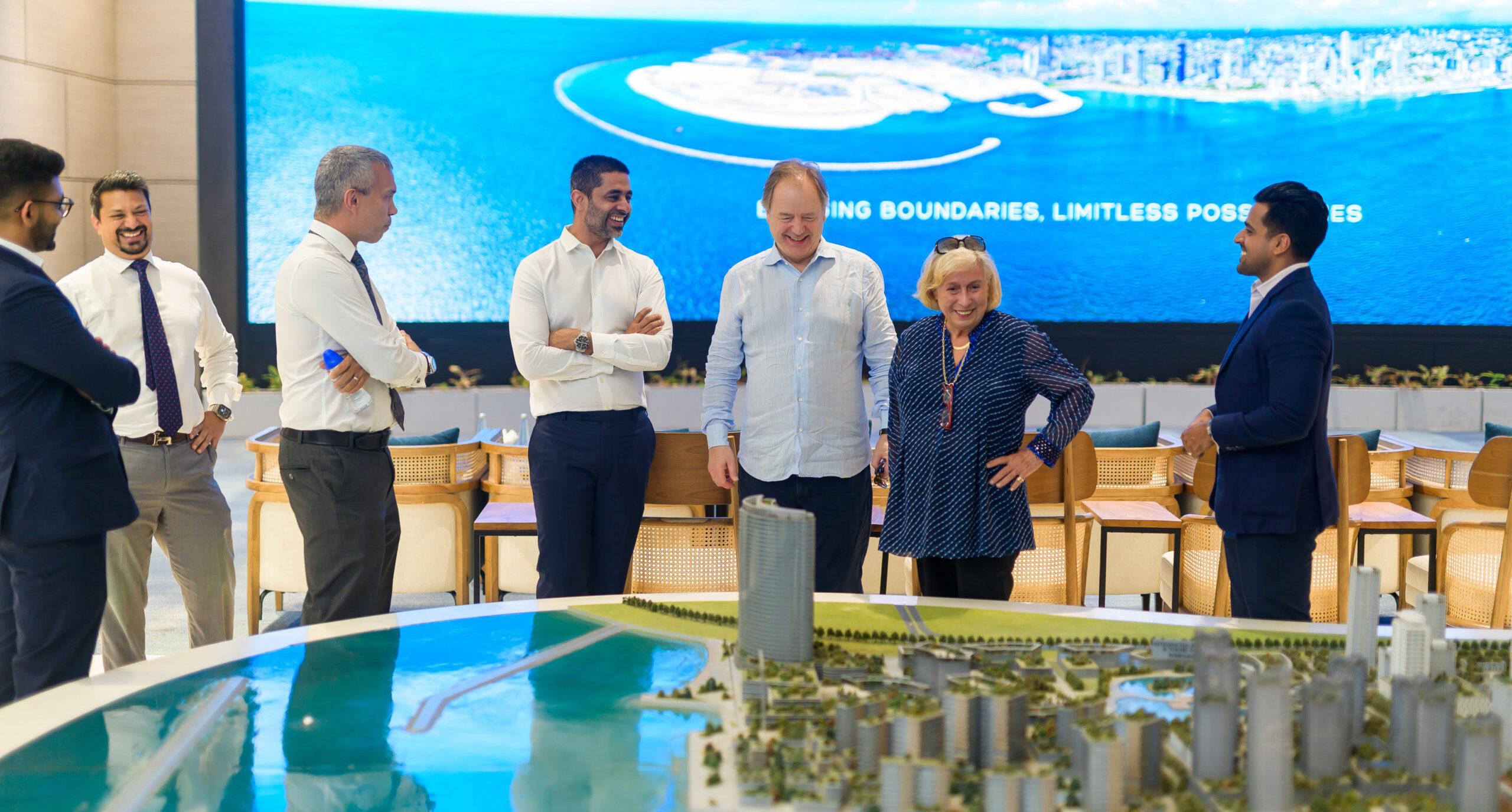Foreign Direct Investment (FDI) continues to play a defining role in shaping long-term growth trajectories, especially in developing economies. With more than 60% of its 2.7 billion citizens under the age of 30, the Commonwealth represents one of the world’s youngest and fastest-growing population groupings. Its combined GDP has grown to US$14.2 trillion (2022) and is forecast to reach US$20 trillion by 2029, with intra-Commonwealth trade expected to surpass US$1 trillion by 2026. Population growth and increasing trade flows present a major opportunity for investment-led development across the 56 Commonwealth countries.
Against this backdrop, Sri Lanka stands at a critical juncture. Following a period of severe economic strain, the country is repositioning itself as a forward-looking, services-led economy.
Central to this ambition is Port City Colombo. As an ambitious and transformative master-planned city development comprising 269 hectares of reclaimed land adjacent to the Colombo Port, Port City Colombo was built with the intention of making it the island’s first foreign-currency designated Special Economic Zone (SEZ) dedicated to modern services.
Driving Job Creation and Economic Diversification
The project is expected to generate over 143,000 direct jobs at maturity, while creating more than 440,000 employment opportunities during its construction phase.
With core focus areas including international trade and commerce, maritime and logistics, financial services, information technology, business process outsourcing (BPO), corporate headquarters operations, and tourism, Port City Colombo has been designed to diversify and strengthen Sri Lanka’s economic base.
Port City Colombo represents more than a national project: it is an effort to integrate Sri Lanka into high-value global networks in trade, finance, and services, including those across the Commonwealth.
Sri Lanka’s Enduring Commonwealth Legacy
Sri Lanka has long played an active role within the Commonwealth. Alongside just seven other countries, Sri Lanka was a signatory to the London Declaration of 1949, which laid the foundations for the modern Commonwealth, which now includes 56 countries across 5 continents. This early commitment to shared values of cooperation and development has shaped Sri Lanka’s active engagement over the decades, notably hosting the Commonwealth Heads of Government Meeting (CHOGM) in Colombo in 2013.
The Commonwealth Enterprise and Investment Council (CWEIC) is the official business network mandated by Commonwealth Heads of Government to facilitate trade and investment across its 56 member states. CWEIC operates across public and private sectors, linking over 130 Strategic Partners from more than 35 countries to business and government leaders across the Commonwealth.
CWEIC’s engagement in Sri Lanka dates back to its founding in 2014, marked by regular high-level visits, trade missions, and ongoing collaboration with public and private sector leaders. Sri Lanka has remained an active participant in Commonwealth economic initiatives, and CWEIC has welcomed substantial Sri Lankan delegations to major forums and engagements across the Commonwealth network. Recognising Sri Lanka’s strategic location and investment potential, CWEIC established a presence in Colombo in 2017, reaffirming its long-term commitment to supporting the country’s economic development within the broader Commonwealth network.
It was in this context that CWEIC and Port City Colombo partnered to support the project’s objectives, with CWEIC leveraging its global network to act as a trusted facilitator. This collaboration not only helps attract investor interest to Port City Colombo, but also showcases Sri Lanka’s potential as a resurgent South Asian economy with the ability to complement regional goals and objectives—while reaffirming the country’s commitment to the region and its growth.
The relationship has developed steadily and strategically. In 2022, Port City Colombo was introduced at the Commonwealth Business Forum in Kigali, held alongside the Commonwealth Heads of Government Meeting (CHOGM). Since then, the project has been featured at key Commonwealth investment forums in London and Samoa, where it has consistently been positioned as a flagship opportunity for global investors.
In February 2024, Lord Marland, Chairman of CWEIC, visited Sri Lanka and engaged directly with local business leaders at a dedicated networking session hosted by Port City Colombo. His message was unequivocal: “Port City Colombo will be a winner for those who participate in it.” This endorsement is more than symbolic. It represents a strong vote of confidence from one of the most influential trade and investment bodies in the Commonwealth.
While traditional sectors like tea and tourism have long driven Sri Lanka’s economic narrative, it is Port City Colombo that represents the country’s future.

Lord Swire, Deputy Chairman of CWEIC, also echoed similar sentiments during his visit to the development in February 2025, emphasising that while traditional sectors like tea and tourism have long driven Sri Lanka’s economic narrative, it is Port City Colombo that represents the country’s future. “Sri Lanka needs to show that it is open for Foreign Direct Investment,” he said, noting the compelling opportunities within the SEZ framework of Port City Colombo.
The Commonwealth Advantage
This is where the “Commonwealth Advantage” plays an important role. Rooted in similar legal and administrative systems, widespread use of English, and trusted networks across the 56 members, the Commonwealth Advantage reduces bilateral trade costs by an average of 21% and increases investment flows between member countries by 27% compared to the global average. This makes projects such as Port City Colombo particularly attractive to investors seeking stable investment environments that promote the ease of doing business, especially when coupled with consistent regulatory and institutional reforms.
A Strong Regulatory Foundation
The Colombo Port City Economic Commission Act, passed in 2021 with bipartisan support in Parliament, established the Colombo Port City Economic Commission (CPCEC), which serves as a single-window facilitator and regulator for all business activity within the SEZ. This legal and regulatory clarity is essential for building investor confidence, particularly in emerging markets.
As of June 2025, 130 companies have been onboarded as Authorised Persons (APs), while over 70 more have applied to be a part of the SEZ business ecosystem and are currently pending approval. Approximately 24 commercial entities have also received the BSI designation. These firms span a wide array of sectors — IT, finance, logistics, healthcare, real estate, shipping, and professional services — underscoring the SEZ’s cross-sectoral appeal.
Early Anchor Developments and FDI Momentum
Anchor developments within Port City Colombo have also begun to materialise with The Mall at Port City Colombo, established with an FDI of US$7 million. Further, three globally renowned travel retail operators including China Duty Free, One World Duty Free, and Flemingo Travel have established a presence within The Mall at Port City Colombo.
Similarly, the US$5 million investment into the Business Centre at Port City Colombo, a premier IT and business park, has already handed over the office space to key anchor tenants and is set to be fully operational by Q3 2025. This business park will provide state-of-the-art commercial space for businesses in banking, financial services, technology, trade, and professional services, bringing advanced expertise and technologies to Sri Lanka, while fostering local employment and capacity building.
Another noteworthy venture is the luxury Marina Development, which commenced construction in January 2025 with a US$121 million investment. Spanning over 33,000 square meters, the marina will feature retail and leisure facilities, a sunset bar, and berthing for 200–250 yachts. This not only fills a critical infrastructure gap in the region, but also significantly enhances Sri Lanka’s profile as a luxury tourist destination.

From Vision to Reality: A Public-Facing Transformation
The inflow of over US$1.4 billion in FDI to date to Port City Colombo, and more committed investments of similar scale in the pipeline, serves as powerful testimony to investor belief in the project’s potential. To sustain and amplify this momentum, Sri Lanka must continue to demonstrate regulatory clarity and political stability.
Public-facing developments such as the Marina Promenade, artificial beach, and public parks are now open, attracting over two million visitors since 2023. These developments have signalled a visible shift from concept to reality and provides further credibility to the investment proposition of Port City Colombo.
By spotlighting Port City Colombo on global stages and connecting it with potential investors, CWEIC looks forward to continue to support Sri Lanka’s investment ecosystem and redefine its economic narrative. Historically reliant on traditional sectors and development aid, the country can now project a new image, one of innovation, resilience, and strategic readiness.
A Replicable Model for the Commonwealth
Port City Colombo stands as a powerful example for the wider Commonwealth of how well-designed Special Economic Zones can drive investment, regulatory reform, and economic diversification.
With its clear legal framework, investor protections, and sectoral focus, the project offers a replicable model for other Commonwealth countries seeking to create business-friendly environments that support sustainable, long-term growth.
As the country moves forward, Port City Colombo stands as both a catalyst and a symbol of ambition, reform, and readiness. It is not merely an infrastructure project; it is a statement that Sri Lanka is open for business, and that its best economic chapters are yet to be written.
Originally published in the Daily Mirror.


